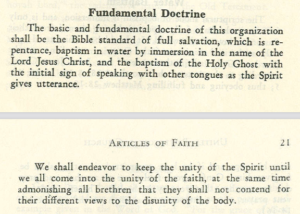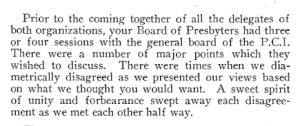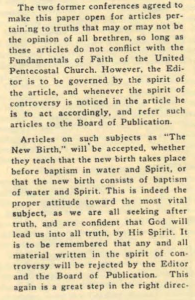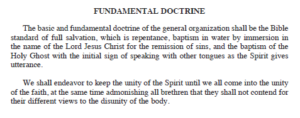The following is part two of a six part guest series from Alicia Sounier Dwivedi, a former United Pentecostal Church member. See Part 1.
*********
Growing up in the church I’m sure it seemed like I was a very well-rounded young person. On the outside I was happy and dedicated (and I was), yet on the inside I was full of turmoil that never subsided. I remember receiving awards at our end of the year school banquet for having Christian character (not my words, but those who issued the awards). I received the gym award almost every year, the principle’s award, supervisor’s award, and two-times pastor’s awards. These were the BIG-TIME awards, and I’d get one each year. I’m not bragging. I’m saying this to say it seemed to everyone else I was truly a good Christian young person (and I was). So how then could I still be begging for salvation 13 years after I became a part of the church? There I was developing the fruit of the Spirit, but didn’t recognize it for what it was because I couldn’t get past tongues. So shameful.
When I graduated from the Christian School at 18, I specifically remember feeling so lost and confused. School was over. I had no idea what to do with my life, and still didn’t know if I was saved. Full of fear and anguish, I told my mom I couldn’t live this church life anymore. I was going to walk away from God because I didn’t know what he wanted from me. I wasn’t going to walk away from him because I wanted the world – I WAS GOING TO WALK AWAY FROM HIM BECAUSE I TRULY DIDN’T THINK HE WANTED ME.
I identified with the man in the Bible who buried his talents in the sand because he felt God was a hard taskmaster. Instead of using his talents, he didn’t want to lose his talents. Not only did I not know what my talents were or what I was supposed to do with them, I didn’t want to potentially lose anything God had given me.
I couldn’t go before the throne of God with boldness – I still didn’t know if I was saved. This was the mental battle of my life. I felt like God’s burden was heavy, his yoke was not easy for me, and I did not have peace that passed all understanding. What I did have was insecurity and fear. No matter how I turned myself inside out, dedicated myself to fasting, outreach, and gave tithes and offerings I just could not speak in tongues (especially an “adult tongue”). What good was I to the kingdom of God if I couldn’t even be assured of my own salvation?
My precious mother cried her eyes out when I told her how I was feeling. My mom was a tongue-talker, and oftentimes gave messages in tongues which would then be interpreted. To me she was amazing (and she is). She asked me if I’d be willing to go to CLC Bible College in Stockton, CA if she could scrape together the money on a single-parent’s salary. I told her I’d be willing to go. So off I went.
While at CLC I had the same struggle of course. Nothing changed for me spiritually while there, but because I didn’t know what else to do – I stayed at the college until a severe car accident forced me from returning for my last year as a music major. While there, however, a new concept was opened in my mind. One very prominent and well-known teacher, Daniel Segraves, taught women were not to cut their hair. This was the same teaching as my home church – no confusion – cut and dry belief. However, this teacher’s son, Mark Segraves, was also a teacher at the college who believed women could cut their hair. [Note from Lois: Mark once held license in the UPCI but has not for over a decade.] I was shocked! How could two ministers/teachers and father/son completely believe the opposite on such an important subject? Was there such a fine line in what I was taught that there could actually be another viewpoint? Turns out, yes, there is indeed another viewpoint (listen to debates).
Side note – oftentimes people who leave the UPC are credited with causing division. This is such a fallacy. There are huge divisions within itself and oftentimes even from church to church in the same section. When the division becomes too huge – a split takes place. There have been quite a few church splits over the years (no fault of ‘backsliders’). Not only are there splits, but some churches leave the UPC altogether over issues that cannot be agreed upon (no fault of ‘backsliders‘).
I can remember going to various churches within our district, some were even stricter than us while some were less. Everybody looking around at everybody else, judging in our minds who is better or not due to outward standards. But when we are taught to judge every outward appearance as Godliness then we become the best little judgers. The very nature of the UPC’s teaching on outward standards being so cut and dry naturally produces one of the most judgmental groups within Christianity. Side-note ended. Let’s continue with my story…
The severity of my inferiority was so monstrous that I didn’t date one guy while at CLC for 2.5 years. They all wanted to be preachers. Why would I date someone who wanted to be a preacher? I was STILL begging God to save me. How could I pray for God to save other people when I didn’t feel I was saved with any certainty?
To this day I don’t like praying out loud. It’s become such a phobia it turns my stomach when I hear my own voice in prayer. I can pray internally, feel the presence of God touching me and directing me, but am very quiet. However, if I’m in a church filled with people who are praying out loud, THEN I can pray loudly – as long as my own voice is drowned out. I believe all the years of verbally calling out to God to fill me with the Holy Ghost with the evidence of speaking in other tongues became a torment. Gradually over time my voice quieted with doubt. So then I started praying for God to forgive me for my doubt and “help my unbelief”. God said if I asked, I’d be given what I asked for. If I knocked – he’d open the door to me, yet I felt so shut out. What was wrong with me?
My pastor often preached about the unwise virgins who let their oil run low therefore being unable to go with the bridegroom when he came. For us in this current age this meant we had to continually show we were full of the Holy Ghost by speaking in tongues. I was so going to Hell, but not by choice. This led to another thought as I didn’t understand how having the Holy Ghost could be compared to needing gas in a car. You either have it or you don’t, right? It’s not like you’ll run low like a car does, and somehow not be able to make it in the rapture because you don’t have enough Holy Ghost to fly you all the way up to the Heavens.
My pastor also shared a story from his past where he couldn’t feel the presence of God for like a full day. No matter how much he prayed and cried he just couldn’t feel God like normal. This scared him so much, and he thought God was taking his Spirit from him and rejecting him, like God had rejected King Saul. When my pastor could finally feel God’s presence again, he wept like a baby. I would often think to myself that if my pastor felt this horrific terror of possibly being rejected after only one day, then he really had no idea what it was like to be in my shoes of feeling rejected for years.
For a long time I mistakenly corresponded speaking in tongues with having the Holy Spirit. The presence of God moving within us is not tongues, and this was one of my greatest misunderstandings. For I knew what the presence of God was and felt like. I’d been experiencing him from the time I was a very little girl.
I think in many of our United Pentecostal churches today, people assume just because ‘tongues’ are present in a service it means what’s happening is of God. This is hugely erroneous. Just think of churches that do snake handling and poison drinking…I’ve seen videos where tongues are being spoken in the background of those services too. Anyone believe God condones that? Tongues are NOT the basis of judging whether a situation is right or not. God doesn’t take his Spirit from us when we do something bad, and then give his Spirit back to us after the bad thing is over. I’ve even heard some people say they speak in tongues while having sex. Yup, I just said that. GROSS! Is this really what the Holy Spirit was given for? REALLY?
Deanna Jo of Responsible Faith interviews Alicia:
See Part 3.












